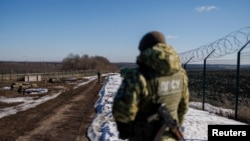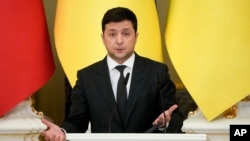Ukraine on Wednesday welcomed the range of Western sanctions imposed against Russia for its menacing actions in eastern Ukraine, while Kyiv's security council called for a national state of emergency and the government recalled its ambassador to Moscow.
Tensions mounted two days after Russian President Vladimir Putin decreed the eastern Ukraine regions of Luhansk and Donetsk were independent states and sent what he characterized as "peacekeeping forces" across the Ukrainian border, stoking fears of a broader conflict with the one-time Soviet republic, which has been independent since 1991.
Several Ukrainian state websites, including the government and foreign ministry home pages, could not be accessed on Wednesday. Ukrainian authorities said this week they had seen online warnings that hackers were planning major attacks on government agencies, banks and the defense sector. Kyiv blamed Moscow for the cyberattacks although Russia has denied any involvement.
The head of Ukraine's National Security and Defense Council called a nationwide state of emergency for 30 days — subject to parliamentary approval. The Ukrainian Foreign Ministry advised against travel to Russia and urged anyone there to leave immediately, contending that Moscow's "aggression" could curb its ability to provide consular services.
Meanwhile, Russia began evacuating its diplomatic posts in Ukraine and by Wednesday afternoon the Russian flag was no longer flying over its embassy in Kyiv, where police surrounded the building.
The United States, European Union, Canada, Britain and Germany took a variety of actions Tuesday to punish Russia and promised harsher sanctions if Russian troops advance further into Ukraine.
On Wednesday, U.S. President Joe Biden imposed sanctions on the company and its executives that built the new Nord Stream 2 natural gas pipeline running under the Baltic Sea from Russia to Germany. German Chancellor Olaf Scholz on Tuesday had halted certification for the pipeline, which is completed but not yet operational.
"First decisive steps were taken yesterday, and we are grateful for them," Ukrainian Foreign Minister Dmytro Kuleba tweeted. "Now the pressure needs to step up to stop Putin. Hit his economy and cronies. Hit more. Hit hard. Hit now."
British Foreign Secretary Liz Truss said, "We have not yet seen a full-scale invasion, but we are very clear that if President Putin escalates, we, the international community will escalate our sanctions."
Australia added sanctions Wednesday targeting members of Russia's security council, while Japan joined with asset freezes for certain Russian individuals and a ban on the issuance of Russian bonds in Japan.
"Australians always stand up to bullies, and we will be standing up to Russia, along with all of our partners," Australian Prime Minister Scott Morrison told reporters. "I expect subsequent tranches of sanctions, this is only the start of this process."
Ukraine's military said Wednesday that shelling by pro-Russian separatists in the Luhansk region had killed one Ukrainian soldier and injured six others.
Ukrainian President Volodymyr Zelenskyy signed an order to call up some military reservists, citing a need to quickly staff up the nation's army.
"Ukrainians are a peaceful nation, we want silence, but if we keep silent today, we will disappear tomorrow," Zelenskyy said in a video address late Tuesday.
Putin, who has amassed 150,000 troops along Ukraine's border and recognized areas held by Russian separatists in eastern Ukraine, said Wednesday he is always open to finding a diplomatic solution. But he said, "The interests of Russia and the security of our citizens are non-negotiable for us."
Russian Foreign Minister Sergey Lavrov and U.S. Secretary of State Antony Blinken were due to hold talks this week about the crisis and set the stage for a summit between Putin and U.S. President Joe Biden. Putin's actions scuttled those efforts, with Blinken saying Tuesday that Russia "has made clear its wholesale rejection of diplomacy."
Biden said on Tuesday he was cutting off the Russian government from Western financing and imposed sanctions on two large banks, declaring that its actions in Ukraine were “a flagrant violation of international law.”
Biden pointedly asked during a brief White House speech, "Who in the Lord's name does Putin think gives him the right to declare new so-called countries on territory that belonged to his neighbors?"
Condemnation came from many other U.S. allies and multilateral institutions. United Nations Secretary-General António Guterres said Tuesday, "Let me be clear: The decision of the Russian Federation to recognize the so-called 'independence' of certain areas of Donetsk and Luhansk regions is a violation of the territorial integrity and sovereignty of Ukraine."
VOA's Pentagon correspondent Carla Babb and VOA’s U.N. correspondent Margaret Besheer contributed to this report. Some information for this report came from The Associated Press, Agence France-Presse and Reuters.






